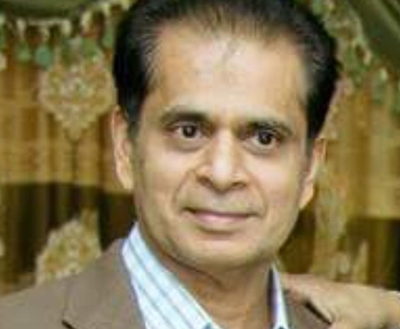Muslims around the world celebrated Eid ul Adha on 10th of Dil Hajithe 12th month of the Islamic calendarand 2 million Muslims performed Haj in Mecca this year. Eid ul Adha also known as Eid e Qurban as it marks the great sacrifice of Prophet Ibrahim (Abraham) when Almighty tested him by requiring his wiliness to sacrifice his only child Ismael. The real sacrifice was replaced by a ram and this event became the fifth pillar of Islam – Haj. It is celebrated throughout the Muslim world with the symbolic sacrifice of a ram or similar permitted animal and the meat being distributed to the needy.
The new Islamic calendar begins with the month of Muharram – starts with the commemoration of the martyrdom of Imam Hussain (625-680/4-61 AH), the grandson of the Holy Prophet of Islam. He was mercilessly murdered in Karbala, Iraq with his family and friends on10th Muharram.
One may think the obvious connectivity between these two occasions even though one event is an occasion for celebration and other event a sad commemoration. Prophet Ibrahim the father of the Abrahamic religions (Judaism, Christianity and Islam) successfully accomplished all the commands of Almighty, and was divinely elevated to the status of an Imam (endowed with Leadership) and promised that the leadership would continue through to his descendants through his son, Prophet Ismael (H Quran, 2:124).
The last Prophet Muhammad (P) (570-632 CE)was a descendent of Ismael. The last message of God Almighty was revealed through Prophet Muhammad and he established an Islamic system based on justice and humanity in Medinawhich later spread throughout the world. Today Islam is the second largest religion in the world (almost 2.2 billion). The system that was established by the holy Prophet continued until the martyrdom of Ali (A) (594-661/21BH-40AH) the first Imam and the fourth rightly-guided caliph of the Muslim nation (Umma).
The struggle for power began when Muawiya (602-680) declared himself as the ruler of the Muslims and began the Ummayad dynasty (661-750). Although the seed of the dynasty being sowed during the period of third caliph (644-656) as Muawiya was serving governor for long-time.The Islamic system established by the Prophet began to diminish and the foundation of justice started to slowly fade away. The destruction of the Islamic system began when Muawiya appointed his son Yazid (647-683) as his successor.
Yazid tried to legitimise his caliphate by forcefully taking approvals (bayat) from prominent figures of the Islamic Umma. Imam Hussain (AS) refused to endorse Yazid’s caliphate. The very personality of Yazid was contrary to thevery principles of Islam. Hussain was the Imam of the time descending from the very chain of Prophet Ibrahim as promised by Almighty God and it was his religious duty to stop such a personality from taking over the office of the caliphate.
Hussain was forced to leave without completing the Haj and proceeded with his family and friends including women and children towards Kufa, Iraq where people had invited him to take up their affairs. Hussain ended up in Karbala, Iraq even though his intention was not to do battle but rather he sought to move away from the jurisdiction of the Caliphate.
While Prophet Ibrahim was explicitly willing to sacrifice his son for the sake of God, the Almighty described this act as the great sacrifice (H Quran, 37:107) and this would-be-action was ransomed by an ordinary sheep. And the great sacrifice was postponed and was yet to take place at some time in the future when such a time would arise. Back to Imam Hussain, Hussain knew thatYazidwould use all his means to continue as the caliph by snatching away every faculty of the religion of Islam and substituting with pre-Islamic customs. The final message had been delivered and the grandson of the final messenger alone was taking the challenge topreserve the religion and prevent Yazid from destroying it. Hussain was whom the Almighty had promised to Prophet Abraham (H Quran, 2:124) who would fulfil by offering the great sacrifice in order to protect the entire Message the work of more than 124,000 prophets, from Adam to Muhammad. He would do so by sacrificing everything in his possession, his children, his brothers and finally himself on the plains of Karbala on the 10th of Muharram 61 AH. The fulfilment of the promise of his great grandfather Prophet Abrahamon 10 Dil Haj was completed on 10 Muharram.
In Karbala Imam Hussain’s sacrifice hassince been instrumental in many struggles to restore many human faculties such as honour, freedomand humanity. Mahatma Gandhi the leader of freedom struggle and icon of nonviolence said “I leaned from Hussain how to be wronged and be a winner, I learnt from Hussain how to attain victory while being oppressed.”The first “Salt March” and non-violent resistance was inspired by Imam Hussain.
Nehru said Imam Hussain’s sacrifices is for all groups and communities, an example of the path of righteousness which enables humanities strength and determination. "It is Hussain’s sacrifice that has kept Islam alive or else in this world there would be no one left to take Islam’s name.” Said Swami Shankaracharya.

Hanif Bismi was born in India and migrated to Australia in 1988. He graduated in Accounting and Finance and currently works for the Australian government. He has post graduate degree in Middle Eastern religion and history from Charles Sturt University. He received university certificate in Iran Studies from University of Sydney. He is currently a research student at Western Sydney University. He writes regularly about current affairs and expert in Australian Muslim migration history and identity. He is currently Vice President MEFF and Advisor to ARO